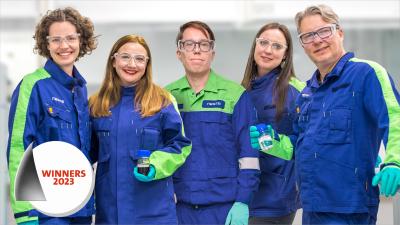Avelino Corma Canós
Molecular sieve catalysts to improve chemical reactions
Winner of the European Inventor Award 2023
Zeolites are catalysts used in chemical processes for a number of purposes, including improving the efficiency and environmental cleanliness of chemical reactions, in addition to breaking down crude oil into gasoline, diesel and other by-products. Zeolites are crystalline materials made up of silicon, aluminium and oxygen, whose porous structure allows them to act as sieves that trap small molecules, where a chemical reaction can then take place.
Although millions of synthesised zeolite structures are theoretically possible, only about 150 have been developed to date. Approximately one-fifth of these have been developed by Corma and his colleagues. Corma’s first synthetic zeolite, a catalyst that improves the octane rating of gasoline produced from crude oil, was developed in 1989. It produced fuel with better mileage, lower carbon emissions in warmer weather and a better capacity to withstand compression in an engine without detonating prematurely. Zeolites produced by Corma and his colleagues have since had numerous practical applications in fields like biomass transformation, removing NOx, and the development of catalysts in the pharmaceutical and cosmetics industries.
When asked about the role chemistry plays in our everyday lives, Corma says: “Think of a normal day. When you get up in the morning, everything that you do and use… your soaps, shampoos, toothpaste… Then you go and have breakfast and get in your car. And in anything you do, you will see that 90-something per cent of the time, chemistry is involved.”
A lasting legacy
Avelino Corma Canós grew up in Moncófar, a small agricultural town north of Valencia. No one in his family had studied at university, but from a young age, Corma’s parents encouraged his curiosity. “My parents always tried to give us something better and they thought knowledge and education were something they could give us. They made it possible for me to go and study.”
Corma began his studies in chemistry in 1967 and continued for over a decade. In 1979, he started working as a researcher at the Consejo Superior de Investigaciones Científicas (Spanish National Research Council), where he began focussing his research on zeolites. Corma’s first zeolite was brought to market by the Spanish petrol company CEPSA (Compañía Española de Petróleos, S.A.U.) and the German chemical firm Süd-Chemie AG (now Clariant), under the brand name HYSOPAR. It has since been adopted at over 20 refineries worldwide.
Revenue generated from patent royalties allowed Corma to co-found the Instituto de Tecnología Química de València in 1990. The institute furthers studies in scientific chemical research, focusing its activity on four main areas: energy, sustainability, health and water.
He is the author of several books, including ‘Catalytic Cracking’ and ‘Introduction to Zeolite Molecular Sieves’, as well as more than 1 200 publications and nearly 200 European patent applications.
Media gallery
Patent numbers:
Press materials
Contact
European Inventor Award and Young Inventors Prize queries:
european-inventor@epo.org Subscribe to the European Inventor Award newsletterMedia-related queries:
Contact our Press team#InventorAward #YoungInventors





